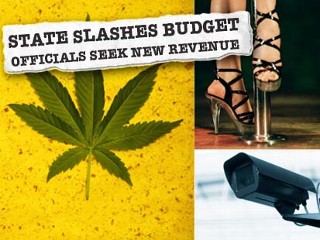In the movies they are played by Pierce Brosnan and Gene Hackman and justify art stealing or snatching of old Nazi German gold. In real life however they are unattractive and miserable figures devoted to the unglamorous and unforgiving life of insurance frauds. They do not have punch lines or happy endings, but their actions speak of great intelligence and/or tremendous stupidity. Here are 10 rascals that are the masterminds behind the most outrageous insurance frauds our time has ever seen. You decide who is who.
10. Tramesha Lashon Fox – Gave A for Arson
Tired of paying the bills on her car, high school chemistry teacher Tramesha Lashon Fox offered two of her underachieving students the grade A if they would “steal” her car and set it on fire. Naturally the two students took the offer but must have screwed something up. Fox not only lost her car, but also her job and freedom in the process.
9. Dr. Andrew Cubria – 750 unnecessary operations later
He may not have won an award for one of the largest fraudsters, but he was one of the cruelest. This cardiologist made a living by performing invasive, painful, and dangerous heart surgery on perfectly healthy people. He paid recruiters to visit homeless shelters and public housing to find indigents, seniors, and drug addicts. These vulnerable people were paid cash to show up at his clinic to submit to a battery to tests, and finally, invasive heart procedures.
In fact, he performed 750 operations on healthy people, and 2 of his “patients” died. He worked at Chicago’s Edgewater Medical Center, and federal prosecutors did not believe he worked alone. All of these illegal, unnecessary, and dangerous procedures were performed to defraud health insurance companies and public health services of millions of dollars.
8. Charles Gavett - The 9/11 Scheme
Charles Gavett did not get famous for the size of his insurance fraud, but for his audacity and bad taste. While most of the US grieved for the dead, Gavett claimed that his wife, Cindy, died in the World Trade Center attacks on September 11, 2001. However, she was really alive and safe in their home. They lived in a fairly small community, and their plans to collect $200,000 from their mortgage life insurance policy were thwarted when neighbors reported they had seen her in town since the attacks.
7. Curtis Donald Keene – Burried his cotton picker
This Georgian farmer managed to bury his cottom picker, a monster of eight ton, in an attempt to claim some insurance money.
6. Sex, greed and $200 million
Martin Frankel’s story contains of sex, greed, and a $200 million dollar fraud. Considering this and then how Frankel looks, we just had to include him on this list. He was fired from one of his first jobs, in the 1980’s, for misrepresenting himself in electronic trades, but by that time he had managed to impress the brokerage owner’s friends, and he had even taken the brokerage owner’s wife as a mistress.
One of these friends staked Frankel with their own savings and Frankel continued to suck investors into his schemes. By the end of this career as an insurance fraud, Frankel had about $205 million and two loyal mistresses to show for it.
5. John Stonehouse – the master of cheesy staged suicides
The british Labour politician with teeth hygiene like no other, John Stonehouse did what any man with debts and a whining wife would do. He staged his suicide and fled to Australia to start a new life with his mistress. The suicide was especially dramatic as he left nothing but his clothes on a beach to make it seem like drowning. Stonehouse was later arrested and convicted of insurance fraud.
4. Carla Patterson – The dead mouse in soup incident
Cracker Barrel once received a complaint from a customer named Carla Patterson. She had found a dead mouse in her soup, thus accusing the restaurant company of violating obvious health regulations. In it for her was $500,000 in insurance money from the restaurant. But when the mouse turned out not to have any soup in its lungs and had not been boiled, Patterson abandoned her claims and received one year in prison.
3. Ronald Evano – The glass eater
Boston resident Ronald Evano actually ate glass to convince his insurance company to pay up. Evano stated that he found the glass in the food and beverage he was eating. The insurance company did not fall for it and sent Evano packing for a 62 month jail sentence. Next time maybe he should try a simpler con.
2. John Darwin - “I think I’m a missing person”
In 2000, John Darwin went missing during a canoeing trip. Assumed deceased by the police Darwin’s life insurance was collected by his wife and life went on to see another day. Five years later a man showed up at a London police station claiming he had amnesia and under the belief of being a filed missing person. As it turned out this man was no other than John Darwin, who after half a decade hiding in Panama could no longer fight his longing for good ‘ol England.
Darwin had thus faked his own death, together with the misses, so that she could collect John’s quite wealthy life insurance. They had not told anybody, not even their children who genuinely thought their father was dead. A well planned life insurance scheme, unveiled only by a photo of the couple in Panama after Darwin’s disappearance.
1. Antoinette Millard – The Saudi Princess from Manhattan
No doubt suffering from poor psychological health, Manhattan girl and investment banker Lisa Walker one day decided to take on the fake and fictive identity of Antoinette Millard – a Saudi princess who had converted to Judaism. In addition to intense mingling with the New York social elite, Millard also tried to convince here insurance company that she had been mugged on jewelry worth $262,000. Princess Millard became such a social phenomenon in New York that even magazine New York Social Diary mentioned the princess.
When the insurance company finally filed the princess’ insurance claim as fraud, Millard confessed her elaborate scheme, blaming it on anything from 9/11 to her rough childhood.
















 I hang out at a local café (you may have noticed I use many imaginative dialogues at the beginning of posts and they’re almost always in a café). I also do some of my own work at the café plus volunteering a little marketing and promotion—basically, I like the place.
I hang out at a local café (you may have noticed I use many imaginative dialogues at the beginning of posts and they’re almost always in a café). I also do some of my own work at the café plus volunteering a little marketing and promotion—basically, I like the place.






 A New York town's decades-long struggle with police corruption has its mayor considering potential measures most would consider drastic: disbanding the entire department and declaring "martial law."
A New York town's decades-long struggle with police corruption has its mayor considering potential measures most would consider drastic: disbanding the entire department and declaring "martial law." "The six officers who may be fired are Darren Lawrence, accused of driving drunk, crashing in Colonie, fleeing the scene and beating a friend to keep him from reporting the incident; Michael Brown [pictured at left], accused of driving drunk, hitting another car, fleeing the scene and refusing a Breathalyzer test; John Lewis, accused of DWI, threatening to kill his ex-wife and numerous other charges; Gregory Hafensteiner and Andrew Karaskiewicz, accused of beating a drunken man during an arrest; and Dwayne Johnson, accused of leaving work four hours early on numerous Tuesdays,"
"The six officers who may be fired are Darren Lawrence, accused of driving drunk, crashing in Colonie, fleeing the scene and beating a friend to keep him from reporting the incident; Michael Brown [pictured at left], accused of driving drunk, hitting another car, fleeing the scene and refusing a Breathalyzer test; John Lewis, accused of DWI, threatening to kill his ex-wife and numerous other charges; Gregory Hafensteiner and Andrew Karaskiewicz, accused of beating a drunken man during an arrest; and Dwayne Johnson, accused of leaving work four hours early on numerous Tuesdays," 
